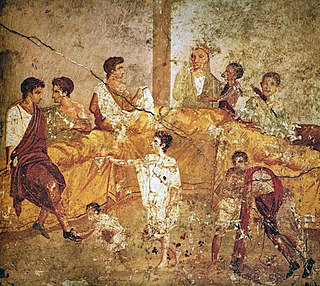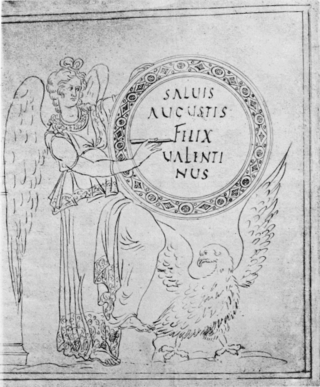Related Research Articles

Romulus Augustus, nicknamed Augustulus, was Roman emperor of the West from 31 October 475 until 4 September 476. Romulus was placed on the imperial throne by his father, the magister militum Orestes, and, at that time still a minor, was little more than a figurehead for his father. After Romulus ruled for just ten months, the barbarian general Odoacer defeated and killed Orestes and deposed Romulus. As Odoacer did not proclaim any successor, Romulus is typically regarded as the last Western Roman emperor, his deposition marking the end of the Western Roman Empire as a political entity. The deposition of Romulus Augustulus is also sometimes used by historians to mark the transition from antiquity to the medieval period.

Clovis was the first king of the Franks to unite all of the Frankish tribes under one ruler, changing the form of leadership from a group of petty kings to rule by a single king and ensuring that the kingship was passed down to his heirs. He is considered to have been the founder of the Merovingian dynasty, which ruled the Frankish kingdom for the next two centuries. Clovis is important in the historiography of France as "the first king of what would become France".

Glycerius was Roman emperor of the West from 473 to 474. He served as comes domesticorum during the reign of Olybrius, until Olybrius died in November 472. After a four-month interregnum, Glycerius was proclaimed as emperor in March 473 by Gundobad, the magister militum and power behind the throne. Very few of the events of his reign are known other than that an attempted invasion of Italy by the Visigoths was repelled by local commanders, diverting them to Gaul. Glycerius also prevented an invasion by the Ostrogoths through diplomacy, including a gift of 2,000 solidi.

RheaSilvia, also known as Ilia, was the mythical mother of the twins Romulus and Remus, who founded the city of Rome. This event was portrayed numerous times in Roman art Her story is told in the first book of Ab Urbe Condita Libri of Livy and in Cassius Dio's Roman History. The Legend of Rhea Silvia recounts how she was raped by Mars while she was a Vestal Virgin, resulting in the twins, as mentioned in the Aeneid and the works of Ovid.

The Battle of Vouillé was fought in the northern marches of Visigothic territory, at Vouillé, near Poitiers (Gaul), around Spring 507 between the Franks, commanded by Clovis, and the Visigoths, commanded by Alaric II. The Franks' victory resulted in their conquest of Gallia Aquitania and the death of Alaric II.

Alcimus EcdiciusAvitus was a Latin poet and bishop of Vienne in Gaul. His fame rests in part on his poetry, but also on the role he played as secretary for the Burgundian kings.
Bertachar was a king of Thuringia from about 510 until about 525, co-ruling with his brothers Hermanfrid and Baderic.
Ruricius I was a Gallo-Roman aristocrat and bishop of Limoges from c. 485 to 510. He is one of the writers whose letters survive from late Roman Gaul, depicting the influence of the Visigoths on the Roman lifestyle. He should not be confused with his son-in-law, Saint Rusticus.
The Chronica or Cronaca Gallica of 511, also called the Gallic Chronicle of 511, is a chronicle of late antiquity preserved today in a single manuscript of the thirteenth century now in Madrid. It resembles in all its traits another late antique Gallic chronicle, the Chronica Gallica of 452, of which it may be a continuation.
Michael Kulikowski is an American historian. He is a professor of history and classics and the head of the history department at Pennsylvania State University. Kulikowski specializes in the history of the western Mediterranean world of late antiquity. He is sometimes associated with the Toronto School of History and was a student of Walter Goffart.
Ajax was an Arian missionary to the pagan Suevi of Galicia who converted them to Christianity in 464 or 466.
The Chronica Gallica of 452, also called the Gallic Chronicle of 452, is a Latin chronicle of Late Antiquity, presented in the form of annals, which continues that of Jerome. It was edited by Theodor Mommsen in the Monumenta Germaniae Historica as Chronica Gallica A. CCCCLII, along with another anonymous Gallic chronicle, the Chronica Gallica of 511.
Susan Treggiari is an English scholar of Ancient Rome, emeritus professor of Stanford University and retired member of the Faculty of Classics at the University of Oxford. Her specialist areas of study are the family and marriage in ancient Rome, Cicero and the late Roman Republic.
Guy Halsall is an English historian and academic, specialising in Early Medieval Europe. He is currently based at the University of York, and has published a number of books, essays, and articles on the subject of early medieval history and archaeology. Halsall's current research focuses on western Europe in the important period of change around AD 600 and on the application of continental philosophy to history. He taught at the University of Newcastle and Birkbeck, University of London, before moving to the University of York.

The Romans were a cultural group, variously referred to as a collective ethnicity and nationality, that in classical antiquity, from the 2nd century BC to the 5th century AD, came to rule large parts of Europe, the Near East and North Africa through conquests made during the Roman Republic and the later Roman Empire. Originally only referring to the Italic Latin citizens of Rome itself, the meaning of "Roman" underwent considerable changes throughout the long history of Roman civilisation as the borders of the Roman state expanded and contracted. With the Roman Empire, Roman identity was a collective geopolitical identity, extended to nearly all subjects of the Roman emperors and encompassing vast regional and ethnic diversity.

The barbarian kingdoms, also known as the post-Roman kingdoms, the western kingdoms, or the early medieval kingdoms, were the states founded by various non-Roman, primarily Germanic, peoples in Western Europe and North Africa following the collapse of the Western Roman Empire in the fifth century. The formation of the barbarian kingdoms was a complicated, gradual and largely unintentional process, as the Roman state failed to handle barbarian migrants on the imperial borders, leading to both invasions and invitations into imperial territory, but simultaneously denied barbarians the ability to properly integrate into the imperial framework. The influence of barbarian rulers, at first local warlords and client kings without firm connections to any territories, increased as Roman emperors and usurpers used them as pawns in civil wars. It was only after the collapse of effective Western Roman central authority that the barbarian realms transitioned into proper territorial kingdoms.
Jill Diana Harries is Professor Emerita in Ancient History at the University of St Andrews. She is known for her work on late antiquity, particularly aspects of Roman legal culture and society.

The Franco-Visigothic Wars were a series of wars between the Franks and the Visigoths, but it also involved the Burgundians, the Ostrogoths and the Romans. The most noteworthy war of the conflict would be the Second Franco-Visigothic War that included the famous Battle of Vouillé and resulted in Frankish annexation of most of Southern France.

Michele Renee Salzman is a distinguished professor of history at the University of California, Riverside. She is an expert on the religious and social history of late antiquity.
Allison Glazebrook is Professor of Greek Social and Cultural History, Gender and Sexuality, and Greek Oratory at Brock University. She was President of the Classical Association of Canada 2018–20.
References
- ↑ "Mathisen, Ralph Whitney". BnF authorities. BnF.
- 1 2 3 4 5 6 7 8 9 10 11 12 Mathisen, Ralph W. "CV". Academia.edu .
- ↑ "Ralph W Mathisen". University of Illinois Urbana-Champaign.
- ↑ "Ralph W. Mathisen". gf.org.
- ↑ Blouin, Katherine (March 11, 2017). "Ancient Mediterranean Civilizations; Sources in Ancient Mediterranean Civilizations". Bryn Mawr Classical Review . Archived from the original on January 31, 2023.
- ↑ Meyer, Elizabeth A. "Roman Aristocrats in Barbarian Gaul: Strategies for Survival in an Age of Transition. Ralph Whitney Mathisen". Speculum . Medieval Academy of America. 71 (2): 463–464. doi:10.2307/2865462. JSTOR 2865462.
- ↑ Van Dam, Raymond (1995). "Roman Aristocrats in Barbarian Gaul: Strategies for Survival in an Age of Transition". The Journal of Interdisciplinary History . MIT Press Journals. 26 (2): 276–277. doi:10.2307/206617. JSTOR 206617 – via Gale.
- ↑ Rousseau, Philip (2004). "R. W. Mathisen, People, Personal Expression, and Social Relations in Late Antiquity. Ann Arbor: University of Michigan Press, 2003. 2 vols: pp. xviii + 298; xvi + 248. ISBN 0-4721-1245-7 (vol. 1); 0-4721-1246-5 (vol. 2). £34.50/US$55.00 each". The Journal of Roman Studies. The Society for the Promotion of Roman Studies. 94: 276–277. doi:10.2307/4135095. eISSN 1753-528X. ISSN 0075-4358. JSTOR 4135095. S2CID 162385735 – via the CUP&A.
- ↑ Claussen, M. A. (February 2, 2002). "People, Personal Expression, and Social Relations in Late Antiquity. Two Volumes". Bryn Mawr Classical Review.
- ↑ Van Dam, Raymond (June 7, 2002). "Society and Culture in Late Antique Gaul. Revisiting the Sources". Bryn Mawr Classical Review.
- ↑ Gaddis, Michael (2003). "Law, Society, and Authority in Late Antiquity (review)". Journal of Early Christian Studies . JHU Press. 11 (2): 251–253. doi:10.1353/earl.2003.0024. ISSN 1067-6341. S2CID 170586280 – via Project Muse.
- ↑ Prostko-Prostynski, Jan [in Polish] (January 23, 2001). "Law, society and authority in late Antiquity". Bryn Mawr Classical Review.
- ↑ Vessey, Mark (1990). "R. W. Mathisen, Ecclesiastical factionalism and religious controversy in fifth-century Gaul. Washington, D.C.: Catholic University of America Press, 1989. Pp. xix + 347. ISBN 0-8132-0658-8". The Journal of Roman Studies . The Society for the Promotion of Roman Studies. 80: 260–261. doi:10.2307/300346. JSTOR 300346. S2CID 162361310 – via the CUP&A.